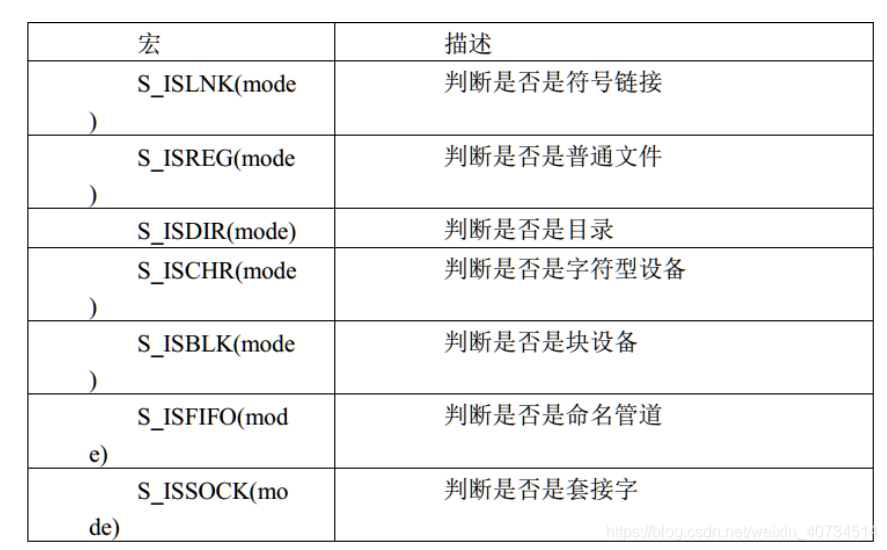Linux6:與時間有關的shell命令,時間程式設計,檔案屬性和目錄操作
與時間有關的shell命令,時間程式設計,檔案屬性和目錄操作
與時間有關的shell命令:
date // 顯示當前日期-- 中國北京時間
date -u //顯示當前日期時間 -- 世界標準時間 UTC
date -R // 顯示當前日期時間 – RFC格式
執行:
$ time // 顯示程式執行的時間
time ./a.out 可執行程式a.out
顯示:
real 0m10.081s 程式開始執行到結束的時間
user 0m0.000s 使用者CPU時間
sys 0m0.004s 系統CPU時間
說明
使用者cpu時間:就是執行使用者指令所用的時間。
系統CPU時間: 就是該程序執行核心程式所經歷的時間
$ cal // 顯示日曆
指令:
cal month year 顯示指定年月的日曆: cal 4 20001.時間程式設計:
GUN/Linux 提供的時間獲取API
資料型別定義及結構體描述
typedef long time_t;
struct tm {
int tm_sec; /* 秒:取值區間為[0,59] */
int tm_min; /* 分:取值區間為[0,59] */
int tm_hour; /* 時:取值區間為[0,23] */
int tm_mday; /* 一個月中的日期:取值區間為[1,31] */
int tm_mon; /* 月份(從一月開始, 0 代表一月) :取值區間為[0,11] */
int tm_year; /* 年份:其值等於實際年份加上 1900*/
int tm_wday; /* 星期:取值區間為[0,6],其中 0 代表星期天,1 代表星期一,以此類推 */
int tm_yday; /* 從每年的 1 月 1 日開始的天數:取值區間為[0,365],其中 0 代表 1 月 1 日,1 代表 1 月 2 日,以此類推*/
int tm_isdst; /* 夏令時識別符號,實行夏令時的時候,tm_isdst 為正,不實 行夏令時的進候, tm_isdst 為 0;不瞭解情況時, tm_isdst()為負*/
};函數:
獲取日曆時間:
time
函數原型
time_t time(time_t *t);
功能
返回日曆時間
所屬標頭檔案
<time.h>
引數
time_t型別的指標變數,或者填充NULL
返回值
成功返回日曆時間,失敗返回-1
–
獲取格林威治時間
gmtime
原型
struct tm *gmtime(const time_t *timep);
功能
將引數timep所指定的日曆時間轉換為標準時間
所屬標頭檔案
<time.h>
引數
timep待轉化的日曆時間
返回值
成功返回世界標準時間,以struct tm形式儲存
程式碼演示:獲取格林威治時間:
#include <stdio.h>
#include <time.h>
int main()
{
time_t mytime;
struct tm *stm;
mytime = time(NULL);
stm = gmtime(&mytime);
printf("%d年 %d月 %d日 %d時 %d分 %d秒\n",1900+stm->tm_year,1+stm->tm_mon,stm->tm_mday,stm->tm_hour,stm->tm_min,stm->tm_sec);
return 0;
}執行結果:

獲取本地時間
localtime
原型
struct tm *localtime(const time_t *timep);
功能
將timep指向的日曆時間轉換為本地時間
所屬標頭檔案
<time.h>
引數
timep:指向待轉化日曆時間
返回值
返回以struct tm形式儲存的本地時間,失敗返回NULL
程式碼演示:獲取本地時間:
#include <stdio.h>
#include <time.h>
int main()
{
time_t mytime;
struct tm *stm;
mytime = time(NULL);
stm = localtime(&mytime);
printf("%d年 %d月 %d日 %d時 %d分 %d秒\n",1900+stm->tm_year,1+stm->tm_mon,stm->tm_mday,stm->tm_hour,stm->tm_min,stm->tm_sec);
return 0;
}執行結果:

字串形式顯示時間
asctime
原型
char *asctime(const struct tm *tm);
功能
將struct tm格式的時間轉化為字串
所屬標頭檔案
<time.h>
引數
帶轉化的tm格式的時間
返回值
字串顯示的時間
程式碼演示:字串形式顯示時間:
#include <stdio.h>
#include <time.h>
int main()
{
time_t mytime;
char *ch = NULL;
struct tm *stm;
mytime = time(NULL);
stm = localtime(&mytime);
printf("%d年 %d月 %d日 %d時 %d分 %d秒\n",1900+stm->tm_year,1+stm->tm_mon,stm->tm_mday,stm->tm_hour,stm->tm_min,stm->tm_sec);
ch = asctime(stm);
printf("時間:%s\n",ch);
return 0;
}執行結果:

日曆時間轉本地時間
ctime
原型
char *ctime(const time_t *timep);
功能
將日曆時間轉化為本地時間
所屬標頭檔案
#include <time.h>
引數
待轉化為日曆時間
返回值
返回一字串表示目前當地的時間日期。
程式碼演示:日曆時間轉本地時間:
#include <stdio.h>
#include <time.h>
int main()
{
time_t mytime;
char *ch = NULL;
struct tm *stm;
mytime = time(NULL);
ch = ctime(&mytime);
printf("時間:%s\n",ch);
return 0;
}執行結果:

2.檔案屬性:
大小 檔案型別 建立時間 路徑等等。。。
屬性描述:
struct stat {
dev_t st_dev; /*如果是裝置,返回檔案使用的裝置號,否則為 0*/
ino_t st_ino; /* 索引節點號 */
mode_t st_mode; /* 檔案型別 */
nlink_t st_nlink; /* 檔案的硬連線數 */
uid_t st_uid; /* 所有者使用者識別號*/
gid_t st_gid; /* 組識別號 */
dev_t st_rdev; /* 裝置型別*/
off_t st_size; /* 檔案大小,位元組表示 */
blksize_t st_blksize; /* 系統每次按塊Io操作時塊的大小(一般是512或1024)*/
blkcnt_t st_blocks; /*塊的索引號 */
time_t st_atime; /* 最後存取時間,如read*/
time_t st_mtime; /* 最後修改時間*/
time_t st_ctime; /* 建立時間 */
};獲取屬性:
stat
功能
提供檔案名字,獲取檔案對應屬性。
函數原型
int stat(const char *path,struct stat *buf)(第一個引數為傳入的檔案,第二個引數為屬性)(檔案不開啟執行stat)
所屬標頭檔案
<sys/types.h>、<sys/stat.h>、<unistd.h>
引數
path:檔案路徑
buf:返回檔案的檔案資訊
返回值
成功返回0,失敗返回-1
參考程式碼:獲取檔案索引節點,建立時間的屬性:
#include <stdio.h>
#include <time.h>
#include<sys/types.h>
#include<sys/stat.h>
#include<unistd.h>
int main(int argc,char *argv[])
{
struct stat buf;
int ret;
ret = stat(argv[1],&buf);
if(ret < 0)
{
perror("stat");
return -1;
}
printf("索引節點%ld\n",buf.st_ino);
printf("建立時間:%s\n",ctime(&buf.st_ctime));
return 0;
}執行結果:

fstat
功能:
通過檔案描述符獲取檔案對應的屬性。
函數原型
int fstat(int fds,struct stat *buf)(第一個引數為傳入的檔案描述符,第二個引數為屬性)(檔案開啟後才能執行fstat)
所屬標頭檔案
<sys/types.h>、<sys/stat.h>、<unistd.h>
引數
fds:檔案描述符
buf:返回檔案的資訊,
返回值
成功返回0,失敗返回-1
程式碼演示:通過檔案描述符獲取檔案對應的屬性:
#include <stdio.h>
#include <time.h>
#include<sys/types.h>
#include<sys/stat.h>
#include<unistd.h>
#include <fcntl.h>
int main(int argc,char *argv[])
{
struct stat buf;
int fd;
int ret;
fd = open(argv[1],O_RDWR);
if(fd < 0)
{
perror("open");
return -1;
}
ret = fstat(fd,&buf);
if(ret < 0)
{
perror("stat");
return -1;
}
printf("索引節點%ld\n",buf.st_ino);
printf("建立時間:%s\n",ctime(&buf.st_ctime));
close(fd);
return 0;
}執行結果:

lstat
功能
連線檔案描述名,獲取檔案屬性。
函數原型
int lstat(const char *path,struct stat *buf)
所屬標頭檔案
<sys/types.h>、<sys/stat.h>、<unistd.h>
引數
path:檔案路徑
buf:返回檔案的檔案資訊,針對符號連結,返回連結本身,而不是非目標檔案
返回值
成功為0 失敗為-1
程式碼演示:連線檔案描述名,獲取檔案屬性:
#include <stdio.h>
#include <time.h>
#include<sys/types.h>
#include<sys/stat.h>
#include<unistd.h>
int main(int argc,char *argv[])
{
struct stat buf;
int ret;
ret = lstat(argv[1],&buf);
if(ret < 0)
{
perror("stat");
return -1;
}
printf("索引節點%ld\n",buf.st_ino);
printf("建立時間:%s\n",ctime(&buf.st_ctime));
return 0;
}執行結果:

注意:
stat和lstat的作用完全相同都是取得引數file_name 所指的檔案狀態, 其差別在於, 當檔案為符號連線時, lstat()會返回該連結本身的狀態,而不是非目標檔案(也就是返回的是連線檔案的資訊)。
stat 和 fstat的差別
一個傳遞帶路徑的檔名或者目錄名
傳遞檔案的描述符
相關指令
ls -ail
2408949 -rwxr-xr-x 1 root root 70 04-21 12:47 lsfile.sh
索引節點 檔案種類和許可權 硬連結個數 擁有者 所歸屬的組 檔案或目錄的大小 最後存取或修改時間 檔名或目錄名
檔案種類
當為[ d ]則是目錄
當為[ - ]則是檔案;
若是[ l ]則表示為連結檔案(link file);
若是[ b ]則表示為裝置檔案裡面的可供儲存的介面裝置(可隨機存取裝置);
若是[ c ]則表示為裝置檔案裡面的串列埠裝置,例如鍵盤、滑鼠(一次性讀取裝置)
硬體連線數
1就是它本身 大於1就是有快捷方式 ln -s 建立
關聯
ls命令實際上就是呼叫stat等系統呼叫的函數讀取檔案屬性並顯示出來
判斷檔案型別:

程式碼演示:判斷檔案的型別:
#include <stdio.h>
#include <time.h>
#include<sys/types.h>
#include<sys/stat.h>
#include<unistd.h>
int main(int argc,char *argv[])
{
struct stat buf;
int ret;
ret = lstat(argv[1],&buf);
if(ret < 0)
{
perror("stat");
return -1;
}
printf("索引節點%ld\n",buf.st_ino);
printf("建立時間:%s\n",ctime(&buf.st_ctime));
if(S_ISLNK(buf.st_mode))
printf("該檔案是 l\n");
if(S_ISREG(buf.st_mode))
printf("該檔案是 -\n");
if(S_ISDIR(buf.st_mode))
printf("該檔案是 d\n");
if(S_ISCHR(buf.st_mode))
printf("該檔案是 c\n");
if(S_ISBLK(buf.st_mode))
printf("該檔案是 b\n");
if(S_ISFIFO(buf.st_mode))
printf("該檔案是 p\n");
if(S_ISSOCK(buf.st_mode))
printf("該檔案是 s\n");
return 0;
}執行結果:

表示該檔案為普通檔案。
參考結構流程圖:
時間程式設計 檔案屬性 目錄操作
注:需要使用xmind軟體進行檢視